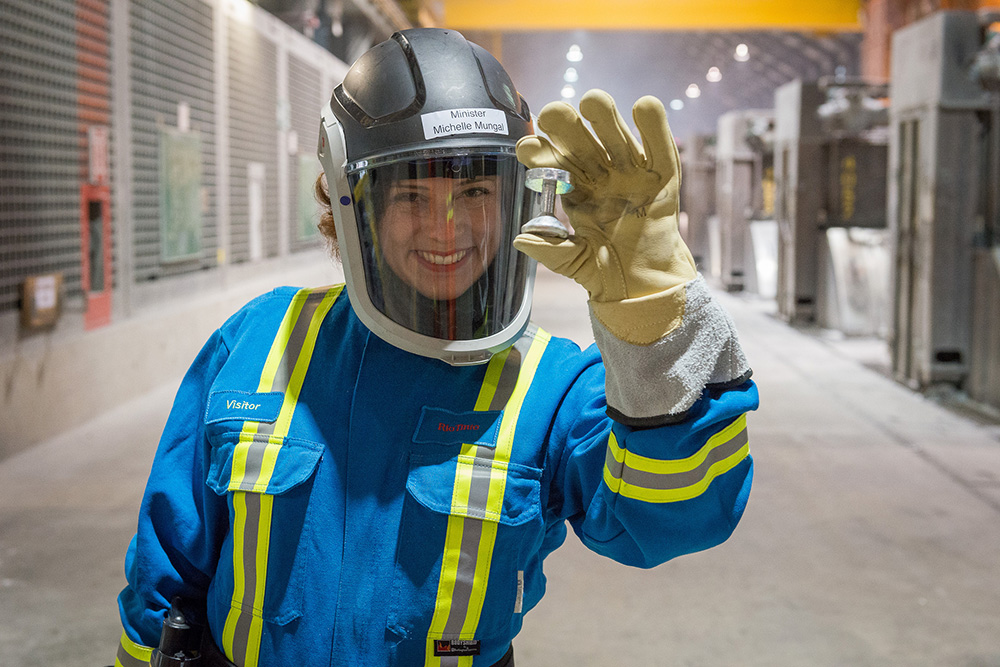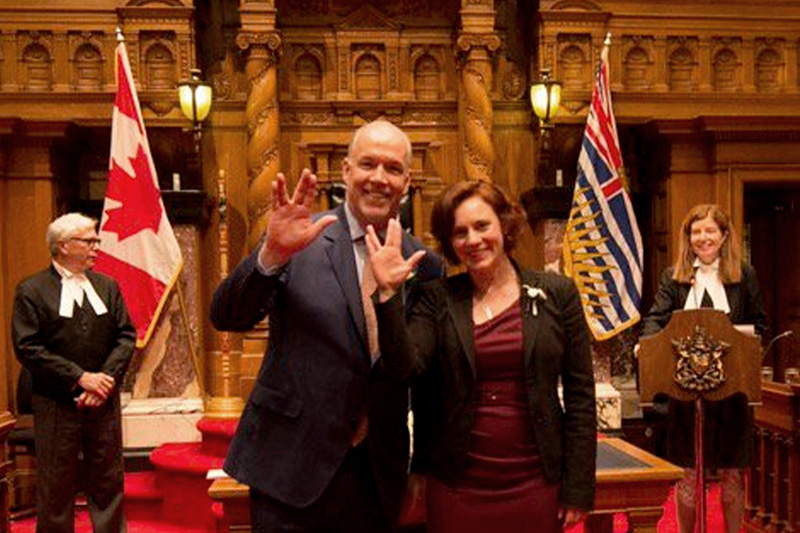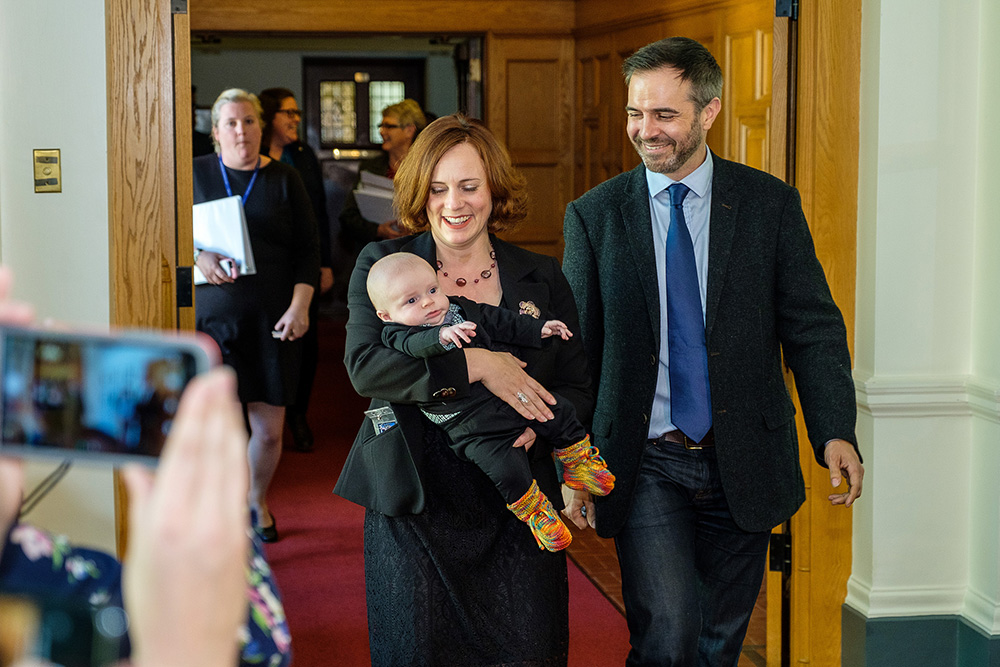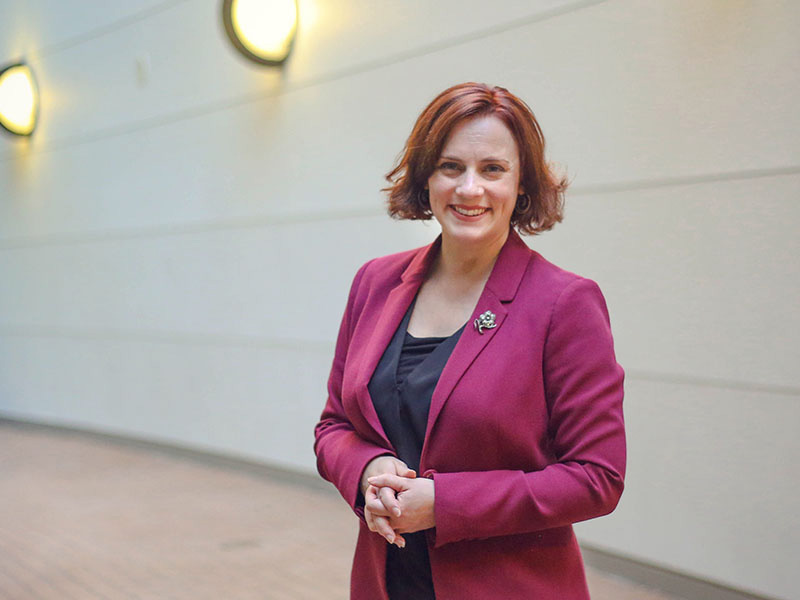Michelle Mungall says she’s not generally a fan of hockey metaphors.
But she uses one to explain what it was like to join British Columbia Premier John Horgan to announce the government would continue building the Site C dam, a project she had fiercely opposed in Opposition.
It was like taking the ice in a Stanley Cup championship game against a much stronger team, knowing you can only lose, said Mungall, the energy, mines and petroleum resources minister.
“You have to go out there and you have to do your best all the same,” she said. “It was a tough day for sure.”
But that’s the reality of being in government, not Opposition, says Mungall, first elected to the B.C. legislature in 2009 as the 31-year-old MLA for Nelson-Creston.
The Site C decision was one of the defining moments of the NDP government’s first year. While it pleased some supporters, including the unions whose members would help build and operate the publicly owned project, it was deeply disappointing to others.
A year later, Mungall does not regret the decision.
An NDP government wouldn’t have started the project, she said during an interview in her office, much of it conducted with her five-month-old son Zavier on her lap. But that didn’t make it easy to stop.
“That’s the nature of being responsible for decisions, is that you have to weigh out everybody’s interests,” she said. In Opposition, the NDP’s Power BC plan emphasized conservation and other alternatives to building the dam.
Stopping Site C would have cost government $4 billion, she said, and that would have reduced its ability to provide programs like health care and child care.
“When you come into government you have to look at all the factors, and you have to think about the long-term impacts of your decision on future generations as well as the existing generation,” Mungall said.
“It’s not so easy to put your mark in the sand and say it’s never going to change. You have to be open to doing the most responsible thing and ensuring that everybody’s interests are met to the best of our abilities.
“I think it was the right decision so we can meet all British Columbians needs. And those are the types of decisions you’re faced with in government.”
The Site C decision signalled a willingness to say yes to industrial development, even when there were strong voices against it in the party. It’s a dynamic that’s played out in other decisions, including encouraging the LNG Canada project.
Mungall’s acceptance of Site C surprised many, including supporters. In part, that’s because she was an outspoken and effective critic in Opposition.
In 2016, Mungall was captured on video at a Site C protest. She talked about convincing Horgan to oppose the project.
“It’s not OK to flood 80,000 hectares of agricultural land,” she said, characterizing the dam as “a 1953 solution to a 2016 problem.”
Mungall did note that then-premier Christy Clark had vowed to push the project past the point of no return so a new government couldn’t cancel it. But she also told the protesters, “Our desire is to keep the Peace where it is, running free, stop Site C.”
Green Party Leader Andrew Weaver posted the video on his Facebook page. “I would suggest a recall campaign in Nelson-Creston would be in order if Site C is approved on her watch as energy minister,” he wrote.
Weaver was unavailable for an interview for this story, his staff saying he was in Mexico on holiday.
In her speech Mungall referred to Brian Churchill, a professional biologist in the Peace River for decades before becoming president of the NDP’s Nelson-Creston constituency association, a position he held during the last provincial election.
Reached by phone, Churchill, a Site C opponent, confirmed that he’d stepped down from the constituency association. He said it was for personal reasons and declined to comment on Mungall’s performance as minister. The government had lots of advice about the cumulative impacts of development in the Peace, he said. “They didn’t take it.”
Others weren’t reluctant to speak. Ken Boon is the president of the Peace Valley Landowner Association and a director of the Peace Valley Environment Association. He’s a farmer, campground operator and log home builder whose expropriated lands are slated for flooding.
“I think she was put in as energy minister with marching orders that put extreme limitations on what she could do,” Boon said. Senior staff from the previous government and the BC Hydro board remained to influence her.
“The result has been that when it comes to the energy file under her ‘watch,’ the NDP have basically doubled down on what the former Liberal government started,” Boon said. “I really do not know how much influence Michelle Mungall has on important decisions on her file.”
It’s not just the continuation of Site C, a project already $2 billion over budget, he said. “They have virtually given away our natural gas resources to LNG Canada in order to get an LNG plant going. This will be fracked gas from northeast B.C.”
Boon said the contradictions are part of the NDP’s basic architecture.
“The NDP has always been a complicated party, and they seem to have a somewhat green/clean wing, and a resource extraction ‘brown’ wing,” he said. “They are also very self-conscious of not saying ‘no’ too many times to projects. Unfortunately, that seems to have clouded their judgment on some important decisions.”
“The political irony is that in the resource ridings such as in northeast B.C., the NDP will never win a seat no matter what they do on the energy file, but it may cost them seats in traditional NDP ridings.”

From LNG critic to booster
As with Site C, Mungall’s comments on LNG in Opposition were strongly skeptical.
“Christy Clark reassures us that moving India and China away from coal-burning facilities to LNG facilities is the cleanest, greenest answer,” she said in response to the 2016 throne speech. “I can’t believe how ridiculous that is. It’s still a fossil fuel!”
As energy minister, Mungall has been much more supportive of the industry. To help make the $40-billion LNG Canada project happen in Kitimat the government came up with some $5.35 billion in incentives.
Mungall says the criticism in Opposition in part reflected concern about the Liberal government’s approach.
“I was critical of some of the things they were saying about it as well and their overall approach to the industry,” she said. “I think we all were in the sense they weren’t doing everything they could to ensure that industry was benefiting British Columbians and looking to the future and thinking about how do we reduce our overall greenhouse gas emissions.”
While the NDP government is continuing to seek LNG development, it has also introduced the CleanBC plan to reduce greenhouse gas emissions and is working to protect natural spaces and wildlife, she said.
The government is managing to reconcile climate action with developing the industry, she said.
“We have to show the world that we can reduce our greenhouse gas emissions, we can introduce a new industry, and we can do it better than anybody else in the world in terms of reducing our overall impact on the environment, whether it be water, land or air. We have to do this.”
B.C. can be a model, she said. “That we show the world it’s possible means that in the U.S., where they are less concerned about reducing greenhouse gas emissions, it shows that there’s no excuse, that they should be doing this. In fact it’s the competitive advantage going into the future in terms of the economy.”
The LNG Canada project was in the spotlight last week when the RCMP arrested 14 people at a checkpoint blocking workers’ access to a pipeline needed to supply the plant. Wet’suwet’en hereditary chiefs said the proposed Coastal GasLink pipeline lacked their consent.
Horgan presented the government’s response to the media.
But Mungall had set out her position in May.
“There are some people within the Wet’suwet’en Nation who have put together this camp and who are opposed. It’s their democratic right to express that opposition in a legal and lawful way,” she said during debate of her ministry’s budget.
The government valued reconciliation and strong, meaningful relationships with First Nations, Mungall said. She’d been reaching out to both the Wet’suwet’en hereditary chiefs and band councils to build that relationship, she said.
But Mungall said that though she had at times stood on picket lines herself, the government would make sure a project that had cleared its legal hurdles went ahead. “It’s absolutely imperative that we uphold the rule of law and that violence is not condoned.”
An early interest in politics
Mungall grew up in St. Albert, an Edmonton suburb, where her experience in politics started young. She remembers running — unsuccessfully — at nine to be treasurer of her school’s student union.
And in Grade 5 she mounted a campaign to have a school dance. “We didn’t get it, but my principal always admired my tenacity,” she said.
In her last year of university she was the NDP’s candidate for St. Albert in the 2001 federal election. She got six per cent of the vote, but says it’s always a good experience to participate in democracy.
In 2001, when she was in her early 20s, Mungall moved to Nelson.
“When I arrived in the Kootenays, I realized that I was a Kootenay girl my whole life. It just took me awhile to get there. I love the mountains and St. Albert’s very flat.”
The next year, at 24, she ran for council in Nelson — a long-shot, newcomer candidate. Bob Hall, then the managing editor of the Nelson Daily News, recalled later that he didn’t think she had a chance when she announced her candidacy.
“There was Mungall on the front page with her pink T-shirt, her small group of young supporters with their hats on sideways, holding a ‘Michelle Mungall for Council’ banner,” he wrote. “Her enthusiasm and clever campaigning combined with a sweeping call for change at the ballot box.”
“Mungall went on to be a pretty decent councillor,” he concluded. “A little cocky at times for a first timer, but overall not a bad addition to the table.”
Mungall didn’t run again after her first term. She worked with community development groups in Nelson, did a six-month placement with the YWCA in Zambia and finished a master’s degree in the human security and peacebuilding program at Royal Roads University in Victoria.
Ahead of the 2009 provincial election, when three-term Nelson-Creston MLA Corky Evans decided not to run again, Mungall sought and won the NDP nomination for the constituency. On election day she received 55 per cent of the vote.
In Opposition she was one of the NDP’s most effective critics, succeeding in getting the government to make changes to policies affecting people on income assistance.
“I used my legislative tools to the best of my abilities and we saw some positive change as a result, but it was always uphill,” Mungall said. “Your function in Opposition is always to provide critical analysis. It’s not always necessarily to provide creative problem solving, it’s to provide a critical analysis of the problem solving.... That inherently, over time, can be a bit of a slog.”
‘Significant transition’ to life as a cabinet minister
When the NDP formed government in 2017, Horgan appointed her to cabinet.
“It’s a significant transition,” Mungall said. “It’s like with any new job, you have a pretty steep learning curve, and definitely I think all of us had a steep learning curve,” she said. “Learning the basics in all of our files, learning all the people who work within the ministry, meeting them, getting to know them, all the stakeholders associated with each ministry.”
“It was a happy challenge, it was a good challenge, and one we had all been waiting for, for such a long time,” she said. “For myself, I won’t say that it was easy, it wasn’t, and I won’t say it wasn’t challenging, because it was very challenging, but it was so great to have that challenge and so exciting.”
After the 2013 election, when the NDP was returned to Opposition despite expectations it would form government, Mungall said she resolved to do the best she could to spark change from the Opposition side. She recalls grilling the minister of the day on income assistance rates and having little to show for the effort.
Four years later, when it formed the government, the NDP promptly raised the rates.
“It was the first thing we did,” she said. “It’s that kind of difference.... In Opposition you’re not setting the agenda and you’re not making the decisions. You’re influencing at best.
“Whereas in government you are setting the agenda, you are making the decisions and when you get to see the results of those have positive impacts on people’s lives, it’s very rewarding and it’s exactly why we’re here.”
Mungall asked for the energy, mines and petroleum resources portfolio. “We do two things in the Kootenays very, very well,” she said. “We generate 50 per cent of the province’s power and we have a long history of mining.”
Her own ancestors had been involved in staking some of the original mining claims in the area. “These are two industries that a lot of people who come from the area have a very strong knowledge of, and I’ve always been fascinated by and interested in the file. The premier knew that.”
She said she finds it challenging and fascinating. “Every day’s a complex day and I love that.”
Horgan said he’s happy with the job Mungall is doing. “I’ve got a lot of time for her. She’s a young woman who wanted to expand her horizons,” he said. “She’s worked very, very hard on often times difficult subject matter.”
He also wanted to have a cabinet that not only was half women, but where women were in charge of some of the government’s core files. Besides Mungall in energy, appointments included Carole James in finance, Claire Trevena in transportation, Lana Popham in agriculture and Selina Robinson in housing.
“The challenge for [Mungall] of course is it’s an area of particular interest to me. She was aware of that and she was up for the challenge and she hasn’t let me down,” Horgan said.
He recalled being at the CleanBC climate plan announcement when a question about BC Hydro came up. “I stepped away from the microphone and Michelle stepped up and answered the question better than I would have, because I would have talked too much and it was like, ‘Well done. Well done, young Skywalker. You’ve learned well.’”

And he notes, Mungall has done the job well in what’s been a busy personal year for her.
Former Liberal cabinet minister Bill Bennett, who represented Kootenay East for 16 years, agrees.
“It’s a really hard job,” said Bennett, who also held the energy, mines and petroleum resources ministry. “She’s certainly exceeded my expectations and I think she’s one of Horgan’s bright lights.”
He’s not happy with everything the NDP government has done — he’s critical of the recent electoral reform referendum and worries coming changes to the Environmental Assessment Act may go too far. But the government has been good on energy, mines and petroleum resources, said Bennett, who now works as a consultant to mining industry clients.
“I don’t think that they’ve made enormous changes to the direction the ministry already had,” he said. “I’m actually impressed with the fact that there is obviously a commitment in the premier’s office that obviously flows into the minister’s office and the ministry generally that supports natural resource development both on the mining side and on the energy side. I was pleasantly surprised, I guess.”
It’s ironic that the government is adopting policies it criticized while in Opposition, but it would be much worse if they undid the former government’s work, Bennett said. “There are very good people in that ministry and they’ve obviously been listened to.”
Parenthood and politics
In July, Mungall gave birth to son Zavier. Three months later, she and husband Zak Matieschyn brought him into the legislature.
“For me, it was there with me every single day that I was about to become a new mom, cause this little guy was growing, in utero. Once I delivered, I’m a breastfeeding mom, so again, he’s still very much attached to me. He comes with me most places that I go.”
When we were discussing when to schedule an interview for this piece, Mungall scrolled through her phone searching for a window between meetings, sitting hours of the legislature and breastfeeding.
After our interview, she and Zavier were headed to a ministry Christmas party. Through the fall he had been coming with her onto the floor of the legislature.
“Everyone is just so happy that our democratic institutions are more and more inclusive and for women it hits a particularly interesting note,” she said. “Being able to bring our children onto the floor of the legislature, it’s like we’ve arrived.”

The rules had to be changed to let her bring Zavier into the legislature. “I’m a feminist, and it’s just so great to see that just came about. We didn’t have to fight for it.”
MLAs like Linda Reid, Christy Clark and Jenny Kwan laid the groundwork, but in the end the rule change felt like a natural next step, she said.
On the occasions when she doesn’t bring Zavier with her, she gets complaints from colleagues from all parties.
It’s a dramatic change in an institution that dates from a time when participation of women wasn’t even considered. Today’s women’s washrooms [in the legislature] were intended for men and still have urinals, Mungall noted.
“If you ever need a reminder of how our democracy evolves and changes, go check out the women’s washrooms, because when this building was first constructed we didn’t have the right to vote and nobody thought that we would be coming in here as MLAs, as ministers, as premiers.”
Even with the changes, the job is demanding. There are many weeks away from home and long days in the legislature. Many of those challenges have more to do with being a rural MLA than with being a parent, Mungall said, and there are ways to make it work.
On Monday nights, for example, when the legislature sits until 9 p.m., Mungall’s family has dinner with Spencer Chandra-Herbert, his husband and their young son.
Despite what many see as a dark future for the planet, Mungall said she didn’t hesitate to bring a child into the world.
“If you don’t, who’s going to take care of it? It’s not going to end with our generation. His generation is going to be even greater problem solvers than we are.” She’s optimistic, she acknowledged. “Humans are amazing at creating problems and amazing at solving them.”
People may not like individual government policies, like the Site C decision, but they consider the many things that have been achieved, Mungall said. On her list are advances on child care, putting more resources into education, improving health care, making housing more affordable and taking steps on mental illness and addictions.
“A lot of people come around back to me and say, ‘you know, all of my values are being expressed by this government every single day,’ because the things that I care about are actually making lives better for other people. And we’re doing it,” she said. ![]()
Read more: BC Politics

















Tyee Commenting Guidelines
Comments that violate guidelines risk being deleted, and violations may result in a temporary or permanent user ban. Maintain the spirit of good conversation to stay in the discussion.
*Please note The Tyee is not a forum for spreading misinformation about COVID-19, denying its existence or minimizing its risk to public health.
Do:
Do not: